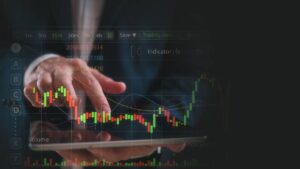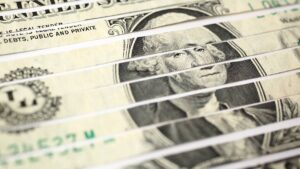David Bassanese: What lies ahead for Australia’s economy and stock market as storm clouds keep brewing?

Getty Images
- BetaShares chief economist David Bassanese said Australia’s economy remains in strong position at the moment
- Weakening economic indicators and the US factor may have a factor on Australian equities moving forward
- Fixed income looking strong with the ‘bond market blood bath’ showing signs of recovery with good yields
It’s a funny beast the economy and stock market game. In fact it’s more like a marriage with vows of for better for worse, in sickness and health. There is a binding relationship between the two with economic activity strongly impacting the stock market.
A rising stock market is usually associated with a growing economy, which in turn leads to greater investor confidence. But the opposite also happens with a downturn in the economy leading to a fall in equity markets and waning investor confidence.
And like any partnership or marriage sometimes the two are pulling in opposite directions. A market might still be rallying despite signs of weakening economic conditions or vice versa.
It’s why so much importance is put on key economic indicators such as GDP, unemployment rates, inflation, investor confidence. Investors look to what is forecasted in the economy to make decisions about where to park their money for the best returns or to ride out any economic storms.
The US relationship
In Australia’s economic and equity market marriage there are other forces at play. What happens with overseas economies and markets (the other couples) can strongly influence what happens at home. The power couple in the room is the US economy and markets.
BetaShares chief economist David Bassanese told Stockhead while Australian equities have rebounded since the start of FY23, he still holds concern about the US economy.
“The markets have had a rebound in the past month but I am still very concerned that the US is still going to have to go into a recession to get inflation down,” he said.
The US has reported two quarters of negative GDP growth which technically defines and means it is in a recession. – although it’s up to a group of economists at the National Bureau of Economic Research to officially call a recession in the US.
However, Bassanese believes while GDP is down other underlying indicators, which are far more positive, need to be considered.
“Spending and demand in the US economy are still strong although the GDP numbers are negative a lot of other indicators like the unemployment rate are still strong,” he said
“The unemployment rate is still trending down at 3.5% so I don’t think the US is in recession yet despite the technical definition.
“A real recession is when unemployment rate goes up several percentage points and you get negative employment growth and we are certainly not in those conditions yet but we may certainly need to go into that to get inflation down.”
Bear market rally
While we may have had more days where the markets have risen than fallen since the start of July, Bassanese said investors do still need to be cautious.
“I fear the recovery in markets we’ve had in the past month may be a bear market rally and there may be a bit more of a down side in the next few months,” he said.
“When the US market sells off our market tends to follow suit more or less but broadly in that direction so it’s going to be hard for our market to rally if the US suffers another leg down in the next few months.”
The US inflation rate is at a 40-year high – an astounding 9.1% year-over-year. The US Federal Reserve has a target inflation of 2% over the longer run, as measured by the annual change in the price index for personal consumption expenditures, is most consistent with its mandate for maximum employment and price stability.
“I just don’t think they can get inflation down without a deeper down turn in the economy if only because the unemployment rate is just so low and wages growth is very strong in the US so they’re operating beyond full employment,” Bassanese said.
Challenging waters ahead
Bassanese said while at the moment the Australian economy is treading water and still sailing in relatively smooth waters, stormy seas may lie ahead.
“GDP growth is strong, consumer spending is strong and unemployment is trending down but we do have consumer confidence weakened on the back of RBA rate rises, house prices are rolling over, building approvals are turning down and the RBA’s forecasting pretty substantial slowdown in growth next year,” he said.
“I think increase in the unemployment rate next year might be a bit more than what the RBA is so far prepared to admit.
“History suggests that during a US recession, our unemployment usually rises by at least 1% – all up I think it will be a pretty challenging 12 months.”
Bassanese said equities will remain under pressure but the fixed income market is looking like good value.
“If there’s any comfort here for investors it’s that those relying on income the bond market bloodbath we’ve seen over the past six months is probably behind us and now you can lock in some good yield,” he said.
The views, information, or opinions expressed in the interviews in this article are solely those of the interviewees and do not represent the views of Stockhead. Stockhead does not provide, endorse or otherwise assume responsibility for any financial product advice contained in this article.
UNLOCK INSIGHTS
Discover the untold stories of emerging ASX stocks.
Daily news and expert analysis, it's free to subscribe.
By proceeding, you confirm you understand that we handle personal information in accordance with our Privacy Policy.








